

With direct contact with dysfunctional individuals on a daily basis, it it important for the staff to be well taken care of, especially when it comes to mental health (e.g stress and coping mechanisms).
To assist in the recovery of addicts, resources such as National Management of Addiction Management (NAMS) offer services to caregivers / professionals to provide trainings as well as psychological help and stress management.
You don't have to do it alone - NAMS. Addiction. The addiction cycle. What it's really like to be a Singapore social worker, from our Woman of the Year. Image: Azmi Athni Shortly after she started working as a social worker in 1987, Dr Sudha Nair was nearly killed by one of her clients.

The woman was trapped in an abusive marriage so Dr Nair helped to put her children in a home and place her in a shelter. “I asked her and she said she didn’t want to stay in the marriage any more so I got a lawyer friend to help out with the divorce,” she recalls. On the morning of the court hearing, the woman was nowhere to be found. Instead, she turned up at Dr Nair’s office later in the afternoon. Traumatised, Dr Nair turned to her mentor and a psychiatrist to find out what she did wrong. She had a narrow escape in more ways than one. In particular, her work on family violence has been groundbreaking, helping to shape public policy. She passionately believes women and children who are abused must not keep quiet about it, and society must thrash out the issue of family violence. Her formative years were spent in Malaysia. Personal experience (part 1) Five Ways Addiction Social Workers Impact Recovery - Advanced Recovery Systems. Social workers traditionally have been the traffic cops of addiction treatment.
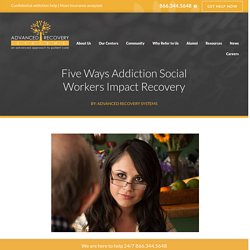
That is because a large part of their role has been to connect clients with the services needed to regain their health. Today, a high number of social workers also provide mental health services as part of the treatment of addiction disorders. Social Work and Opioid Epidemic Principles. Mental Health and Substance Abuse Social Workers. Mental health and substance abuse social workers work with clients who have mental conditions and/or addictions.
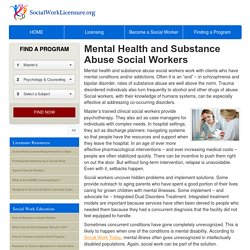
Often it is an “and” – in schizophrenia and bipolar disorder, rates of substance abuse are well above the norm. Trauma disordered individuals also turn frequently to alcohol and other drugs of abuse. Social workers, with their knowledge of humans systems, can be especially effective at addressing co-occurring disorders. Master’s trained clinical social workers provide psychotherapy.
They also act as case managers for individuals with complex needs. Social workers uncover hidden problems and implement solutions. Sometimes concurrent conditions have gone completely unrecognized. Mental health and substance abuse social workers can be found in hospitals, residential treatment centers, social service organizations, and health clinics. How Social Workers Help Substance Abusers Beat Addiction. "Two steps forward, one step back" is an inescapable reality for substance-abuse social workers, in-demand counseling professionals who assist alcoholics and drug abusers on the road to recovery.
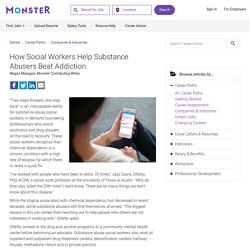
These social workers recognize that chemical dependency is a chronic condition with a high rate of relapse, for which there is rarely a quick fix. "I've worked with people who have been in detox 20 times," says Diana DiNitto, PhD, ACSW, a social work professor at the University of Texas at Austin. "Why do they stay sober the 20th time? Personal experience (part 2) Central Narcotics Bureau using new technology in fight to keep Singapore drug-free. Minister Shanmugam on strengthening Singapore's fight against drugs. Personal Battle Against Drug Addiction. Number of new drug abusers remains high, CNB figures show, Singapore News. SINGAPORE - The proportion of new drug abusers arrested last year remained high and close to two thirds of new abusers were under 30, the Central Narcotics Bureau (CNB) said on Monday (Feb 5).

While the number of drug abusers arrested fell from 3,265 in 2016 to 3,089 last year, about 40 per cent of them were new abusers. Of the 1,249 new abusers arrested, about 64 per cent were below the age of 30. These concerning trends were highlighted by the CNB in an overview of the local drug situation. While there was an overall improvement in the drug situation here, abusers in the 20-29 age group continued to form the largest group in 2017. About 40 per cent of drug abusers arrested last year were under 30. Singapore funds research on synthetic cannabinoids. Singapore, known for some of the world’s most stringent drug laws, aims to develop medical treatments containing synthetic elements of the cannabis, or marijuana, plant.

The government-run National Research Foundation, a body in charge of national research and development, launched a program earlier this year to unlock the therapeutic potential of cannabinoids — chemical compounds of the cannabis plant. It’s part of the organization’s broader $25 million initiative to promote the biotech industry in the Southeast Asian nation. The 2015 Cannabis World Congress Expo in New York City. Andrew Burton | Getty Images The program does not focus on the plant’s psychoactive compound — tetrahydrocannabinol, or THC — that’s responsible for marijuana’s psychological effects. Alcohol addiction can have devastating effects on families; 5 things caregivers can do to help. Personal experience (part 3) The Challenges Of Treating High-Functioning Addicts (And How To Overcome Them) High-functioning alcoholics and addicts are hard to get into treatment, and pose unique treatment challenges once they arrive.
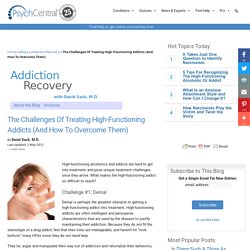
What makes the high-functioning addict so difficult to reach? Denial is perhaps the greatest obstacle to getting a high-functioning addict into treatment. High-functioning addicts are often intelligent and persuasive, characteristics that are used by the disease to justify maintaining their addiction. Because they do not fit the stereotype of a drug addict, feel that their lives are manageable, and haven’t hit “rock bottom,” many HFAs insist they do not need help. They lie, argue and manipulate their way out of addiction and rationalize their behaviors, often so effectively that loved ones and colleagues question their own observations. Harm Reduction: Compassionate Care Of Persons with Addictions. How Mindfulness Transforms Us. Perosnal experience (part 4) WE CARE Community Services : Drug Addictions. Breaking a drug addiction cycle is difficult, but not impossible.
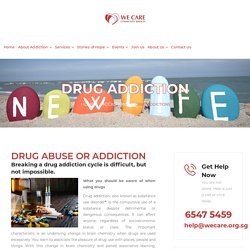
What you should be aware of when using drugs Drug addiction, also known as substance use disorder*, is the compulsive use of a substance despite detrimental or dangerous consequences. It can affect anyone, regardless of socioeconomic status or class. The important characteristic is an underlying change in brain chemistry when drugs are used excessively. Contact Us - National Addictions Management Service (NAMS)
Does social work have to be stressful? To answer this question we need to be clear about the distinction between pressure and stress.
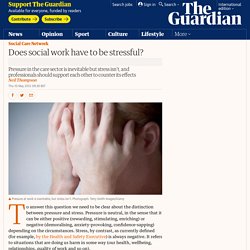
Pressure is neutral, in the sense that it can be either positive (rewarding, stimulating, enriching) or negative (demoralising, anxiety-provoking, confidence-sapping) depending on the circumstances. Stress, by contrast, as currently defined (for example, by the Health and Safety Executive) is always negative. Is being a social worker really harder/more stressful than other jobs? : socialwork.
Coping with stress: Workplace tips. Coping with stress: Workplace tips Job stress can be all-consuming — but it doesn't have to be.
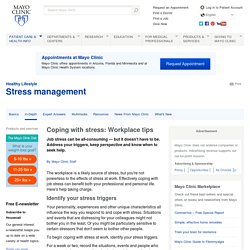
9 Simple Ways to Deal With Stress at Work. According to research, the percentage of Americans who are stressed at work is high, and it’s only getting higher. According to the CDC’s National Institute of Occupational Safety and Health, studies have found the number of Americans who are “extremely stressed at work” range between 29 percent to 40 percent.1 Unfortunately, work stress has significant health consequences that range from the relatively benign—more colds and flu—to the more serious, like heart disease and metabolic syndrome.2 But, because stress at work is so common, finding a low-stress job may be difficult or impossible for many people. Overcoming Stress. Everybody has it, and everybody talks about it, but nobody really knows what stress is. WHY? It is because stress means different thing for each of us, and is also different for each of us.
Manage your stress and become more productive rather than self-destructive. Stress is a part of modern living. It is unavoidable. Stress serves a purpose when it provides us with the motivation to scale new challenges or overcome difficulties. Personal experience (part 5)